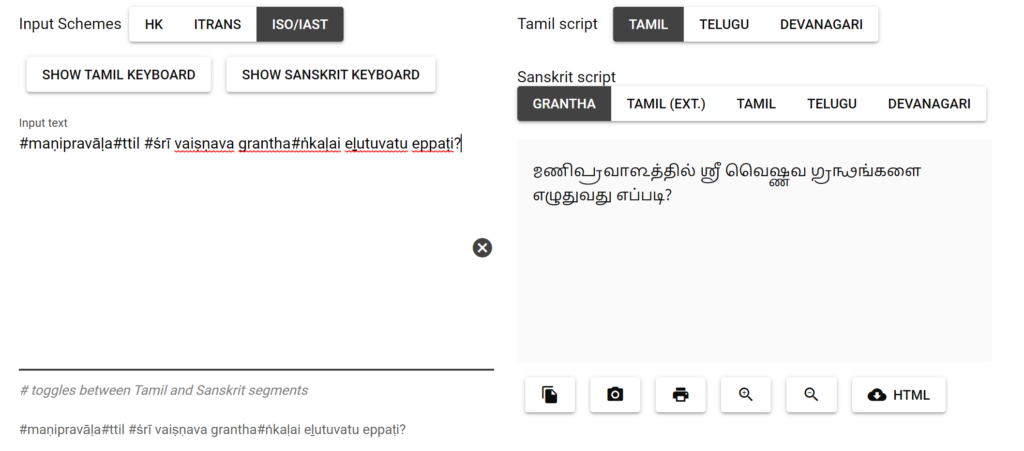Typing Manipravala to be rendered in the traditional scripts can be a daunting task as it involves switching between two scripts (and hence two keyboard layouts) Imagine the plight of the poor typesetters who had to do this manually all those years ago! Therefore, we have created an easy-to-use Manipravala editor, aptly named, Maṇippavaḻam that allows you to type MP with relative ease.
The basic premise is that a user selects a single input scheme, for instance, Harvard-Kyoto, ITRANS, or ISO/IAST to be rendered using the appropriate scripts automatically. However, in order to render the components of MP in the appropriate scripts, the text has to be marked, so as to identify Sanskrit and Tamil segments. This is done using the # (hashtag) symbol. You would need to enclose the Sanskrit portions with # and anything out of those is taken to be in Tamil.
As an example, consider the following MP sentence in Harvard-Kyoto (HK) romanization:
maNipravALattil zrIvaiSNava granthaGkaLai eZutuvatu eppaTi?
We now enclose all the Sanskrit segments within #, which gives us:
#maṇipravāḷa#ttil #śrīvaiṣṇava grantha#ṅkaḷai eḻutuvatu eppaṭi?
Given that the text is in HK, we select the input scheme as HK and type it in the editor as shown below:
You can also use ISO/IAST scheme to convert texts into MP. Do note that the Tamil portions should be ISO but the Sanskrit can be either in ISO 15919 or IAST

You can also display MP in a wide variety of orthographies, by changing the Tamil and Sanskrit scripts respectively. A few historically attested combinations are shown below.



By using the below buttons, you can: copy the rendered text to be pasted elsewhere, capture the text as a screenshot, print it as a PDF document using your browser, increase or decrease the font size or download the entire thing as an HTML document.

Caveats
We use a slightly modified version of Harvard-Kyoto and ITRANS to make it work for Tamil. Here, e/o is used for the short vowels and E/O for long vowels. However, this distinction can be ignored for the Sanskrit segments.
